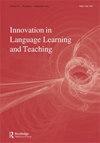Chatbot-based training on logical fallacy in EFL argumentative writing
IF 4.6
3区 教育学
Q1 EDUCATION & EDUCATIONAL RESEARCH
Innovation in Language Learning and Teaching
Pub Date : 2023-04-08
DOI:10.1080/17501229.2023.2197417
引用次数: 3
Abstract
ABSTRACT EFL learners generally have the problem of logical fallacies in EFL argumentative writings. Logical fallacies are errors in reasoning that can undermine EFL argumentative writing quality. Explicit training on logical fallacies may help learners deal with the problem and enhance their self-efficacy and proficiency in EFL argumentative writing, which educational chatbots may further enhance. However, few studies have been conducted in this direction. To fill the gap, we developed a chatbot for out-of-class, self-regulated training on logical fallacies in EFL argumentative writing. Fifteen Chinese EFL undergraduate and graduate students engaged in the training for five weeks. Semi-structured interviews and transcript analysis were conducted to investigate the participants’ perceived impacts of the training on self-efficacy and proficiency in EFL argumentative writing. To triangulate the interview results, we conducted pre–post questionnaires on the participants’ writing self-efficacy and analysed their pre–post argumentative writings based on the Illinois Critical Thinking Essay Scoring Rubric. The results showed that the training on logical fallacies might improve EFL argumentative writing proficiency, although it might reduce writing self-efficacy. Based on the results, we called for more implementation and investigation of chatbot-based training on logical fallacies, especially the long-term training integrated with practice in writing tasks.基于聊天机器人的英语议论文写作逻辑谬误训练
摘要英语学习者在英语议论文写作中普遍存在逻辑谬误问题。逻辑谬误是推理中的错误,可能会损害英语议论文的写作质量。逻辑谬误的明确训练可以帮助学习者处理问题,提高他们的自我效能感和英语议论文写作能力,而教育聊天机器人可以进一步提高这一点。然而,很少有人在这方面进行研究。为了填补这一空白,我们开发了一个聊天机器人,用于课外自我调节的英语议论文逻辑谬误训练。15名中国EFL本科生和研究生参加了为期5周的培训。采用半结构化访谈和成绩单分析的方法,调查参与者对训练对自我效能感和英语议论文写作能力的影响。为了对访谈结果进行三角分析,我们对参与者的写作自我效能感进行了前后问卷调查,并根据《伊利诺伊州批判性思维论文评分准则》分析了他们前后的议论文。结果表明,逻辑谬误训练可以提高英语议论文的写作能力,但也可能降低写作自我效能。基于研究结果,我们呼吁更多地实施和调查基于聊天机器人的逻辑谬误培训,特别是与写作任务实践相结合的长期培训。
本文章由计算机程序翻译,如有差异,请以英文原文为准。
求助全文
约1分钟内获得全文
求助全文
来源期刊

Innovation in Language Learning and Teaching
LINGUISTICS-
CiteScore
6.90
自引率
6.70%
发文量
54
期刊介绍:
Innovation in Language Learning and Teaching is an international refereed journal devoted to innovative approaches to methodologies and pedagogies in language learning and teaching. It publishes research articles, review articles and book/materials reviews. It draws on a range of disciplines that share a focus on exploring new approaches to language learning and teaching from a learner-centred perspective. It will appeal to anyone interested in the development of, research into or practical application of new methodologies in language teaching and learning.
 求助内容:
求助内容: 应助结果提醒方式:
应助结果提醒方式:


